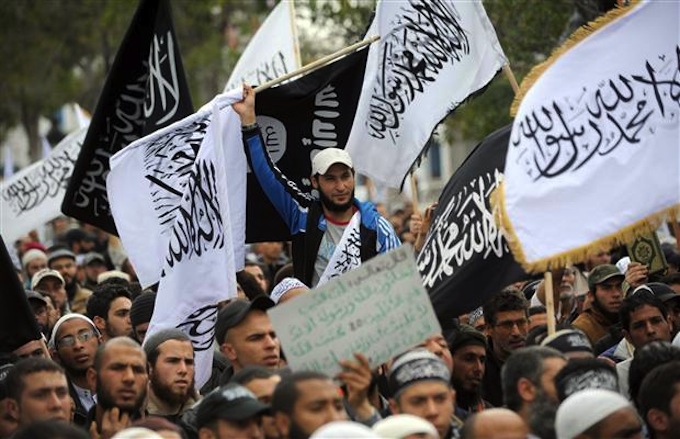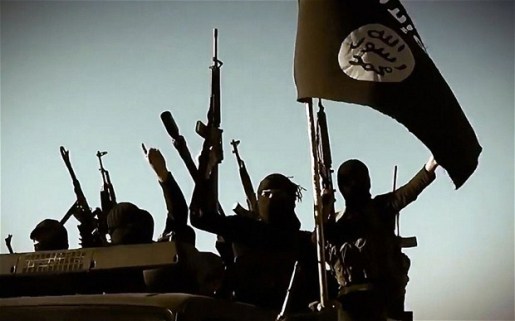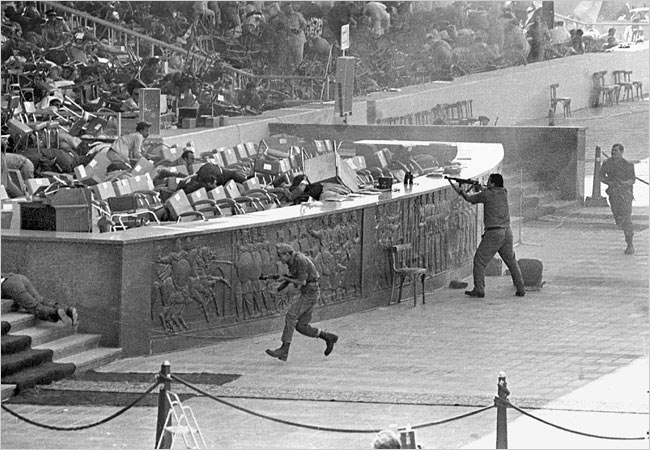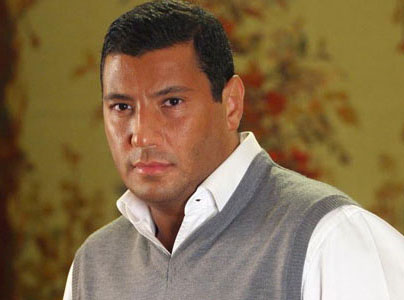
In the first part of this essay we presented the main roots that led to the emergence of extremism and terrorism not being attributed to the Islamic religion. We demonstrated how the terms of reference to the Salafist interpretation of religious texts underpinning the official and popular institutions such as the 'Council of Higher Scholars' and al-Azhar and the like are the same terms of reference underpinning the takfiri jihadist movements.
FOR AS LONG as terrorists draw from the same sources, the difference between the thinking maintained by those bearing weapons and others who do not believe in violence, is purely formal.
More importantly, it is impossible for the bearers of Salafist ideology who do not believe in violence for one reason or another, to prevail over the bearers of extremist terrorist ideology due to their lack of an epistemological credibility to oppose them at the level of its founding principles.
The totalitarianism of present-day extremism is witness to the fact that it is an intellectual issue
It is essential and crucial for politicians, intellectuals and researchers to accept this fact if they really wish to fight the terrorism of today. What leads us to this assertion and to intensify our focus on it is the error that many politicians and analysts fall into when they persist in linking the phenomena of extremism, militancy and extreme cruelty in the treatment of opponents, to the point of shedding their blood, with a novel or extraneous issue with some economic, social, political or topical causality such as Palestine or the war in Iraq. And this all the while that the literature of extremist organizations is replete with religious texts and precedents justifying their atrocities, including the slaughter, burning alive and enslaving of others, acts which exist and are defended within the Salafist system, with the aim of setting up an Islamic caliphal state rather than for any political, economic or other consideration!
Given recent history, we find that over the last two centuries Islamist movements have scored a number of military and political achievements using methods very similar to what more contemporary Islamist terrorist movements such as the Wahhabi movement in the Arabian peninsula, the Mahdist movement in the Sudan used. All of this in spite of the absence of precisely those issues that some politicians and intellectuals are trying to link terrorism with as motivating causes, such as the question of Palestine, or Iraq, or oppression, or the absence of political equilibrium at the global level as a result of the fall of the eastern bloc and the triumph of capitalism.
What also confirms this is that the current wave of terrorism, in all its forms such as random bombings and the slaughter of human beings, began in the regions of the Middle East in late 1981 with the assassination of Egyptian President Anwar Sadat and went on to include Algeria in 1991, where the main objective of terrorism in both cases was the establishment of an Islamic state through the employment of intensive killing and indiscriminate slaughter. Even now there are many Islamist terrorist organizations such as the Pakistani Taliban, the Nigerian Boko Haram and the like, whose ideas and actions demonstrate that the only thing they have in common is hatred of the West and the values of modernity, and the desire to turn the clock back to the seventh century.
The totalitarianism of present-day extremism and terrorism, based on a background of Salafi Islam (particularly its Wahhabi form) and its extension across all lines of longitude and latitude, bridging all the economic, social and political differences between countries, is another witness to the fact that it is fundamentally an intellectual issue. What else but a malignant ideology could bring together people from Nigeria, France, Saudi Arabia, Britain, the Philippines, Kuwait, the Mali desert and the mountains of Afghanistan, with others in Florida, California, Russia, Libya, Belgium, to the end of that very long list. What makes human beings of Chechen origin kill Americans in Boston whose country has no link to what is happening to their people in Russia? Or other examples in fact too numerous to mention.
Salafist ideology enjoys an extensive presence at all levels of state in the Muslim world
There is no doubt that the war on the military and political level against terrorist groups is fully justified and vital, and there is no disagreement as to its importance or whether to support it. However, in our opinion a final and decisive victory will be impossible unless it is accompanied by a war of a different kind, and by this we mean an ‘intellectual war’.
The intellectual defeat of extremism and terrorism is no picnic, for the war of ideas has its own demands and conditions. It also requires a strong political will and vision on the part of the forces that are tasked with vanquishing it, especially since the question of separating politics from religion, one of the most important pre-requisites, is a very difficult issue in the Muslim world.
A sufficient evidence of this is that the ‘secular’ Egyptian state itself, for example, is the enemy and foe of one of the symbols of enlightenment, one emanating from Islam itself in the direction of a new religious discourse to secure the desired harmony between the teachings of Islam and the questions and values of the contemporary era. This is the researcher Islam Buheiry, imprisoned for views that Salafis failed to suppress and in order to silence him sought the aid of the state. Even odder is that this same country is living in a state of open military conflict with extremists and terrorists, and is more in need than others of a new religious vision to shake the intellectual foundation that attracts young people to extremism! In spite of the current intellectual condition of the Muslim world, what is nevertheless very encouraging is the presence of a continually expanding base of enlightened Islamic activists, writers and thinkers who have been able to fashion a radically new Islamic discourse capable of persuading, persisting and even gaining dominance, given the right climate. For the first time in recent Islamic history there is a real possibility of refuting the Salafist school using the religious Text itself.
What is more, it also provides a new element, a favorable opportunity for the success of intellectual change in the presence of political leaders in the Middle East, whose allegiance to the Islamic faith is unquestioned, and who have started to pay attention to the fact that extremism and terrorism constitute an issue to be addressed at the intellectual level of thought, as demonstrated by the unequivocal statements of Vice President of the UAE and ruler of Dubai Sheikh Mohammed bin Rashid, and Crown Prince of Bahrain Prince Salman bin Hamad, and others.
What is encouraging is the presence of enlightened Islamic activists, writers and thinkers
The required intellectual war demands actions that are politically difficult, but necessary to achieve the desired success. Salafist ideology enjoys an extensive presence in all levels of state in the Muslim world, and indeed is protected by the state itself in the unequal struggle between this ideology and the advocates of renewal and secularism in the Muslim world. This being the case, it should be clear that concerted pressure must be created at home by bringing together and organizing enlightened capacities, to combine with another, external, pressure from the international community affected by extremism and terrorism; to bring pressure on the systems that protect the ideas and institutions that generate extremism and terrorism. In our view we may assume that these pressures will result in the following:
- educational reform geared at removing from religious school courses anything linked to the ‘jurisprudence of transactions’, in view of its fundamentally controversial nature; and restricting religious education to matters of faith and its system of values, ethics and worship. It should develop curricula to focus on the development of analytical and critical capacities rather than rote-learning as currently employed in the vast majority of pre-university education institutions in the Muslim world; this in addition to improving them by including a sufficient amount of material aimed at expounding the concepts of philosophy and sociology and at consolidating the concept of a nation.
- Returning the mosque to its natural role as a house of worship and freeing it from engaging in politics and interfering in the affairs of governance, economy and legislation. This requires the state to supervise what is going on in mosques and reduce the grip of the religious groups over them. This applies as much to western governments as to others, in that one of the indications of the dangerous role mosques in the West are playing, is that they have become fertile breeding grounds politically for European extremists and a link to extremist organizations.
- Removing religious institutions, official or otherwise, from political, judicial and executive action and limiting it to its guiding, consultative role.
- Removing the political and administrative constraints imposed on the forces of enlightenment and providing them with opportunities in public forums and research centres, and creating the right climate for an alternative religious discourse based on the Message itself, in harmony with the times, and consistent with universal human values attained by mankind and accepted for the most part by the Organisation of Islamic States.
- Carrying out important reforms in the media field aimed at securing the required balance in broadcast material currently dominated by a Salafist religious stamp. It is well known that media freedom is lacking in most of the Islamic world, where governments play a key role in its direction. It is therefore necessary to re-adjust this and re-deploy financial resources pumping the blood through the arteries of the media in its various forms, whether resources provided by the governments themselves or those pumped by Salafist religious institutions that are possessed of huge power. The media must be transformed into a window for social and intellectual progress, a tool to stimulate scientific progress and a means to nurture in souls the values of goodness and beauty, in place of the current role it plays consecrating ideas of the past and selling illusions to Muslims deprived of most of what is beautiful in life. The media to be reformed is not just that operating n the Islamic world but also that directed from the West. For example, the American Al-Hurra television channel, which was set up primarily to help the Arab world receive professional standard news services and social programmes that were more open and more focused on democratic values, do not give a lot of space to issues of religious enlightenment, the very issues which, as noted above, stand at the forefront of eliminating extremism and terrorism.
Political pressure is highly effective, particularly when linked to a clear vision of outcome. Pressure applied by the West during the era of President W Bush, accompanied by internal pressures exerted by Saudi liberals, led to adjustments to the school curricula in the Saudi Kingdom. The Saudi regime promoted this all the more when it convened a Shura council and established the first mixed educational institution in the history of the Arabian Peninsula – the King Abdullah University – with the formal approval of the religious authority, which generally yields to the political system.
Political action is not enough on its own to curb Salafist ideology and change the mindset of Muslims towards becoming closer to the values of modernity and maintaining rational thinking. There has to be a convincing intellectual alternative hailing from the same religion, one with the capacity to answer questions posed by everyday Muslims and bolster self-confidence, in view of the fact that for more than a millennium the Muslim mind has been captive to ideas generated by the erroneous approaches that we demonstrated in the first part of this article. Those ideas hold, basically, that Islam contains a comprehensive system of celestial provisions which bear no relation to changes in time and place, that these provisions are to be considered obligatory upon Muslims who do not have the option to reject them or change them, and that religious affairs in their entirety are to be subordinated to religious institutions and the class of scholars and doctors of law.

Suggested Reading
Contemporary enlightenment efforts have succeeded in refuting these ideas on the theoretical level, and have thus opened the door wide towards achieving a harmony between the values of religion and the requirements of the times. On the theoretical side the Salafist ideology is dead in the water, but changing Muslim minds to rid themselves of it requires major effort; we are talking about one thousand five hundred million Muslims, most of them victims of Salafist ideology and so subordinated to it that not one of them has come out onto the streets to condemn terrorism committed in the name of Islam, even though the amount of Muslim victims of terrorism outnumbers all others, and even though Muslims are used to filling the streets in protest groups condemning events far less serious. What is more, we are also talking about millions of imams, preachers and activists desperate to keep this corpse alive, since it justifies their existence and their social distinctiveness.
All the same, the Muslim world today is in a more fortunate position to complete the enlightenment project compared to the suffering the West had to go through to achieve the same goal, since humanity has come a long way in framing the forms of modernity, and providing the base for science and knowledge and the mechanisms for advancement. What the world needs now is a way to formulate the vision, devise a strategy for change and make plans for its implementation.



